Posts by Christopher Lochhead
205 Legendary Author Dushka Zapata
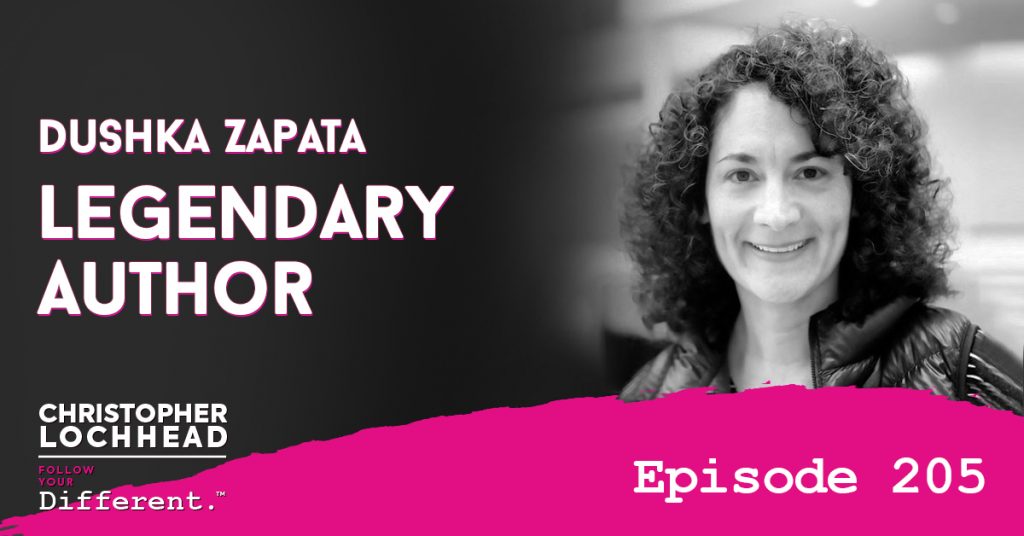
Podcast: Play in new window | Download (Duration: 48:41 — 33.4MB) | Embed
Subscribe: Apple Podcasts | Spotify | Pandora | RSS | More
In today’s episode of Follow Your Different, we are joined yet again by the breathtaking Dushka Zapata. Dushka is one of our regular guests in the podcast and one of the most important and prolific writers this world has to offer. The world truly needs more of Dushka.
Additionally, in an act of radical generosity, Dushka has decided to make all e-versions of her published books available on Amazon, for free, starting March 17, 2021. Everything she has published will be available in ebook form for free within a 24-hour period. We highly recommend going and check out the link and read her astounding books.
The Prioritization of Well-Being
The pandemic has changed everyone’s relationship landscape, and the glue that has held those relationships has modified its fundamental composition. Dushka discusses that the difficulty in prioritizing one’s well-being is due to the fact that oftentimes it is impossible to tell what exactly is the best for one’s well-being.
She shares that the only way to find the answer is to spend time alone, compassionately and gently, giving thought to what is genuinely best for oneself.
“We are all like boats and we all carry other people who take care of the maintenance of the boat. If the boat sinks, you are useless to others. So what is it that you need to do for the boat, which is you? You need to be functional for others.
The most responsible thing that we can do is to think about the best ways we can take care of ourselves.” – Dushka Zapata
The Pursuit of Happiness
Dushka discusses that her definition for the pursuit of happiness is less about being happy and more about the feeling of whether her actions have a sense of purpose. Most people are trapped in a constant state of sabotaging their own happiness because they feel like it’s too much. When in reality, there is no logical limit to how happy one can become.
She encourages people to never believe in mediocrity, low-grade despair, and to devise small steps to interests that bring one closer to happiness.
“There isn’t a higher being monitoring your amount of happiness. I think that if there were a first step, it would be to remove your own tendency to sabotage your own happiness.
If there were a second step, it would be about identifying the wants that are real.
And, if there were a third step, it would be about truly understanding what the difference is between the superficial want and the deeper wants.” – Dushka Zapata
The Architecture of One’s Fabrication
Dushka and Christopher discuss how life is just the story that people tell themselves about the facts, people live in the architecture of their own fabrication. Dushka shares how it is worthwhile to perceive oneself as the person who thinks their thoughts rather than being one’s thoughts. This guarantees a life not filled with suffering over things that are uncontrollable and non-existent.
“To me, a really central part about learning how to love myself has to do with making a distinction between the things I believe that are not true.” – Dushka Zapata
To know more about the legendary Dushka Zapata and how to prioritize your well-being, download and listen to this episode.
Bio:
After working for more than 20 years in the communications industry, Dushka noticed a theme.
People find it very difficult to articulate who they are and what they do.
This holds true for both companies and for individuals.
For companies, this is an impediment to the development of an identity, a reputation, a brand.
It makes it hard for customers to see how companies are different from their competitors.
For individuals, in a new world order of personal brands, it makes it hard to develop one that feels real.
This is the focus of Dushka’s work: she helps companies and people put into simple terms who they are, what they do, and where to go next.
Her work comes to life through message development, presentation training, media training and personal brand development.
It comes to life through executive coaching, workshops and public speaking.
It comes to life through what she writes.
Dushka has written ten bestseller.
Her work has been consumed on Q&A site Qoura 180M times.
Links:
We hope you enjoyed this episode of Follow Your Different™! Christopher loves hearing from his listeners. Feel free to email him, connect on Facebook, Twitter, Instagram, and subscribe on iTunes!
099 Why CMOs Get Fired: Results Do Not Equal No Results Plus An Excuse
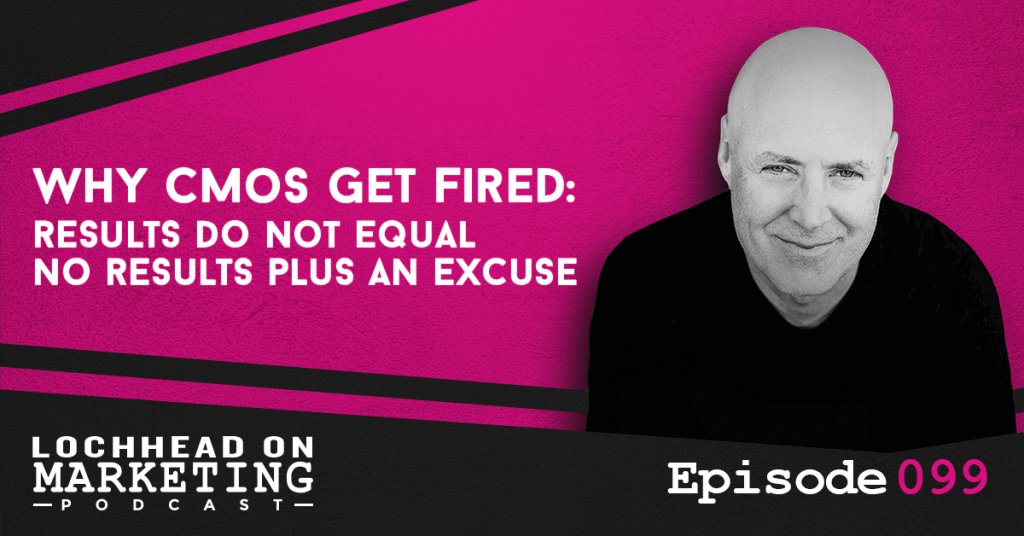
Podcast (lochheadonmarketing): Play in new window | Download (Duration: 15:26 — 10.6MB) | Embed
Subscribe: Apple Podcasts | Spotify | RSS | More
On this episode, let’s talk about producing legendary results in the context of CMO tenure. According to the Wall Street Journal, based on research from Spencer Stewart, the median tenure of a CMO was only 27 and a half months in 2019, which was down from 31 months in 2017. This is in stark contrast to the CEO’s average tenure of 88.4 months or about seven and a half years. CFOs have roughly 63 months or nearly five and a half years.
Success is about producing legendary results. So on this episode, let’s talk about that.
Marketing Is A Constant Revolving Door
One legendary marketing consultant in Silicon Valley and friend of Christopher says that marketing is now a constant revolving door. CMO tenure is down to more or less two years and across all levels in the marketing department. Covid-19 made matters worse and we ask, what is driving this “revolving door”?
“One of them is, everybody in marketing is very busy all the time, very frenzied in a stimulus-response like we’re trying to win the activity contest. Success in business is not about winning the activity contest. As a matter of fact, activity does not equal to results. So yes, shave the dog.” – Christopher Lochhead
Results Do Not Equal No Results Plus An Excuse
The big aha here is results do not equal no results, plus an excuse. Christopher describes sales as binary, you either hit the numbers, exceed the numbers or do not hit the numbers. It is the sole indicator that you are doing well, but this should not be the case for marketers.
“As a CEO, you live and die by the numbers. Every quarter, as the head of sales, chief revenue, officer, VP of sales, whatever title it is, head of sales, that’s true too. The reality is, that should be true in marketing as well. This sort of leads us to the question, what are the marketing results that matter?” – Christopher Lochhead
Marketing Results That Matter
There are lots of things that marketing do so in this episode, Christopher discusses the results that matter. There are only three things that marketing organizations should be focused on:
“Number one, design and dominate a category that matters. Number two drive revenue near term midterm and longterm. And number three, create enduring value as measured by market cap or company valuation. We want to be creating the most valuable company in a category that matters.” – Christopher Lochhead
To know more about the three marketing results that matter, download and listen to this episode.
Bio:
Christopher Lochhead is a #1 Apple podcaster and #1 Amazon bestselling co-author of books: Niche Down and Play Bigger.
He has been an advisor to over 50 venture-backed startups; a former three-time Silicon Valley public company CMO and an entrepreneur.
Furthermore, he has been called “one of the best minds in marketing” by The Marketing Journal, a “Human Exclamation Point” by Fast Company, a “quasar” by NBA legend Bill Walton and “off-putting to some” by The Economist.
In addition, he served as a chief marketing officer of software juggernaut Mercury Interactive. Hewlett-Packard acquired the company in 2006, for $4.5 billion.
He also co-founded the marketing consulting firm LOCHHEAD; was the founding CMO of Internet consulting firm Scient, and served as head of marketing at the CRM software firm Vantive.
We hope you enjoyed this episode of Lochhead on Marketing™! Christopher loves hearing from his listeners. Feel free to email him, connect on Facebook, Twitter, Instagram, and subscribe on Apple Podcast! You may also subscribe to his newsletter, The Difference, for some amazing content.
204 Equality Through Wealth w/ Teri Williams | President of Largest Black-Owned Bank in America OneUnited

Podcast: Play in new window | Download (Duration: 1:18:52 — 54.2MB) | Embed
Subscribe: Apple Podcasts | Spotify | Pandora | RSS | More
Teri Williams is the legendary President and Chief Operating Officer of OneUnited Bank. She is helping transform the country with the empire she is currently building. From purchasing a small struggling community bank in Boston to creating OneUnited Bank, the largest black-owned bank in the United States of America. Since they have started, Teri and her husband, Kevin, with their team have made over $1 billion in loans together. Along with being an entrepreneur, she is also an author with her book, I Got Bank!: What My Granddad Taught Me About Money. Today, we have a powerful conversation about OneUnited Bank’s mission and how the couple runs a successful powerful business while raising two wonderful children. Teri has some fascinating insights on what it really means to make money and the statistics of the black community in the financial system. We also talk about how Teri and Kevin are showing how banking and entrepreneurship can change lives, communities, and even a country.The OneUnitedBank
OneUnited Bank is the largest black-owned bank in the country. It has not only started as a community but is also transforming to becoming a digital bank. The goal they have is to make financial literacy a core value in the black community. Teri gives a bit of her personal background and story, and how she learned business from her grandmother. She shares how one of the important things for the black community is to recognize those individuals who have been there, eliminate the carried shame, and value one’s experiences.“We’re finding ourselves not being able to speak in our authentic voice. We’re finding that our community is not listening to us because we’re not speaking in our authentic voice. So we have changed our communication. It was important for us, as a bank, to speak to the challenges that our community faces, not to run away from them. From that came this bank black movement. It is a bank black movement where black people can speak how they are going to move their money to black owned banks and are going to support black businesses.” – Teri Williams
Black Communities in the Financial System
Teri discusses the statistics and the poor treatment of the black community in the financial system. She shares how the homeownership rate in the black community is 30 percent lower compared to the white community. The number of loans and mortgages from national banks is 1 to 2 percent of all mortgages that are given to black families. Though, there is hope. OneUnited Banks is creating partnerships and transacting with big corporations that are currently making big differences to the community.“Netflix was the first to come out with this. Because of corporations like them, a lot of corporations have followed. I think the corporations realize that this is a way to contribute to what these banks are trying to do. It’s also important for people to know what we do. Over 70% of our lending actually goes into the community and our credit losses are almost zero. It’s not like we’re doing lending that is risky. We are just doing lending that isn’t being done by other institutions. That lending is giving our community an opportunity to build well.” – Teri Williams
OneTransaction Campaign and Conference
For Black History Month, Teri shares the OneTransaction Campaign and Conference that will be held on Juneteenth (June 19, 2021) from 1:00 – 6:00 PM ET (Eastern Time). The campaign will be a free virtual conference encouraging the black community to focus on one transaction in 2021. It will be filled with amazing speakers who are passionate to educate the community on how they can create generational wealth and close the racial wealth gap. We hope you can virtually join and register for the OneTransaction Campaign and Conference and be part of the conversation.“We give them a choice of six transactions. It could be a will, life insurance, home ownership, having a profitable business, improving their credit score or savings, and investments. We ask them to select one of those six transactions and then we provide them with action steps to accomplish that in 2021. We’re having this conference on Juneteenth which is an African-American holiday. We want to really educate the community on how they can build wealth.” – Teri WilliamsTo know more about Teri Williams and the amazing work her and husband are doing at OneUnited Bank, download and listen to this episode.
Bio:
Teri Williams is President and Chief Operating Officer of OneUnited Bank. She is responsible for the implementation of the Bank’s strategic initiatives, as well as the day-to-day operations of the bank. These operational areas include all retail branches, marketing, compliance, lending, information technology, customer support, legal, and human resources. Under her leadership, OneUnited Bank has consolidated the local names and product offerings of four (4) banks to create a powerful national brand supported by innovative products and services. She believes the financial services industry has not connected with urban communities to fully support economic development and wealth building. OneUnited Bank can serve as a bridge by offering affordable financial services for all and financial workshops. She brings 30 years of financial services expertise from premier institutions such as Bank of America and American Express, where she was one of the youngest Vice Presidents. Ms. Williams holds an M.B.A. with honors from Harvard University and a B.A. with distinctions from Brown University. She has served as Treasurer of Dimock Community Health Center in Roxbury, MA for over 5 years. She currently serves on the Boards of the Black Economic Council of Massachusetts (BECMA) where she serves as Treasurer and the 79th Street Corridor Initiative in Miami Florida. Ms. Williams is the author of I Got Bank! What My Granddad Taught Me About Money (Beckham Publishing) a financial literacy book for urban youth. Ms. Williams has received numerous notations and awards for her contribution to urban communities including from the Urban League, NAACP, and the National Black MBA Association.Links:
OneUnited Management Why OneUnited Amazon Books: I Got Bank!: What My Granddad Taught Me About Money Justice Deposits: How NetFlix, Twitter & Costco Are Leading Conscious Capital & You Can Too We hope you enjoyed this episode of Follow Your Different™! Christopher loves hearing from his listeners. Feel free to email him, connect on Facebook, Twitter, Instagram, and subscribe on iTunes098 Social Media Marketing Lie: You Have Be Everywhere on Every Platform 100 Times a Day
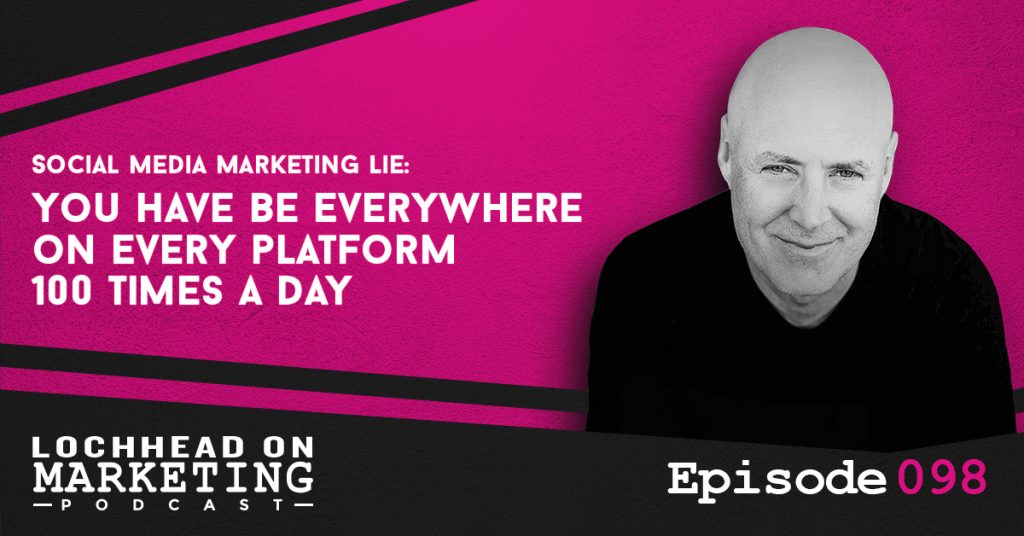
Podcast (lochheadonmarketing): Play in new window | Download (Duration: 14:57 — 10.3MB) | Embed
Subscribe: Apple Podcasts | Spotify | RSS | More
In this episode, let’s talk about one of the dumbest social media marketing lies out there: you have to be everywhere on every platform and you need to put out a hundred pieces of content today. This is terrible advice and it will exhaust you and your marketing team and will piss off your prospects and customers. Ultimately, it will not help you become a category queen and king.
Bio:
Christopher Lochhead is a #1 Apple podcaster and #1 Amazon bestselling co-author of books: Niche Down and Play Bigger.
He has been an advisor to over 50 venture-backed startups; a former three-time Silicon Valley public company CMO and an entrepreneur.
Furthermore, he has been called “one of the best minds in marketing” by The Marketing Journal, a “Human Exclamation Point” by Fast Company, a “quasar” by NBA legend Bill Walton and “off-putting to some” by The Economist.
In addition, he served as a chief marketing officer of software juggernaut Mercury Interactive. Hewlett-Packard acquired the company in 2006, for $4.5 billion.
He also co-founded the marketing consulting firm LOCHHEAD; was the founding CMO of Internet consulting firm Scient, and served as head of marketing at the CRM software firm Vantive.
Links:
Legendary copywriter Ben Settle
Category King of History Podcasts Dan Carlin
We hope you enjoyed this episode of Lochhead on Marketing™! Christopher loves hearing from his listeners. Feel free to email him, connect on Facebook, Twitter, Instagram, and subscribe on Apple Podcast! You may also subscribe to his newsletter, The Difference, for some amazing content.
097 You Are What You Subscribe To
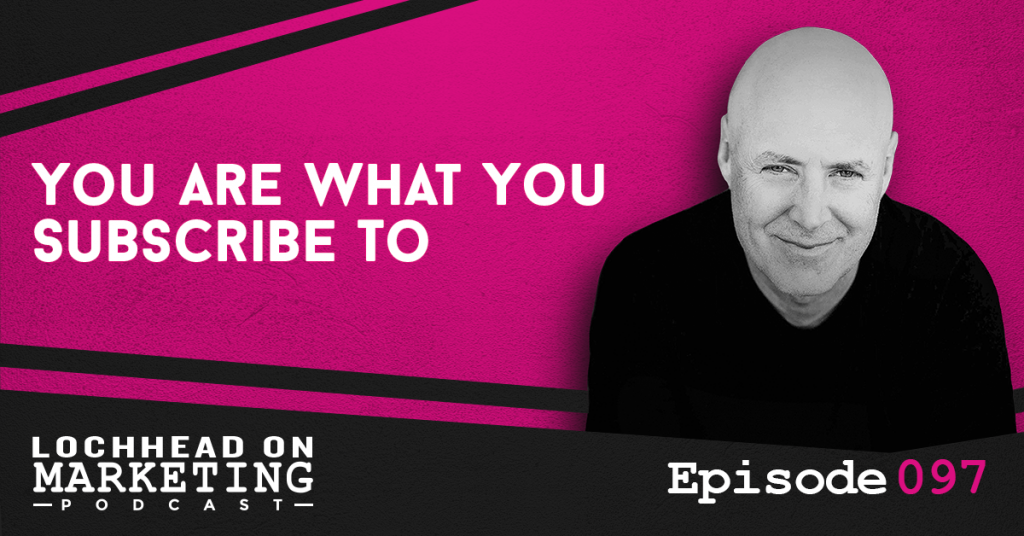
Podcast (lochheadonmarketing): Play in new window | Download (Duration: 10:23 — 7.1MB) | Embed
Subscribe: Apple Podcasts | Spotify | RSS | More
Today, let’s talk a little more about your career. My brother from another mother and co-creator of our new newsletter category pirates, Nicholas Cole has an interesting insight: “you are what you subscribe to.” Christopher thinks he’s right.
So in this episode, find out what media Christopher consumes that he finds life-changing.
“The content we subscribed to, the content we consume, it affects how and what we think about. Our thoughts affect our actions and our actions affect our outcomes, both professionally and personally.” – Christopher Lochhead
F*ck The Hustle Porn Stars
If you’ve been a long time listener, you would know that Christopher is not a fan of these hustle porn stars. He does not believe in hustlin’ all your life. Instead, Christopher pushes for being different and legendary.
“Porn stars say no one ever worked himself to death. Well in Japan, they have a word for it. It’s called Karoshi and it translates into death by overwork. Maybe you can hustle all you want, but there’s a difference between hard work and smart work.” – Christopher Lochhead
Choose What You Consume
We have very limited spaces in our brains so Christopher encourages you to choose what you read and listen to. He gives out a few recommendations such as below:
The OGS
- Peter Drucker – The Effective Executive
- David Ogilvy
New Thought Leaders
- Malcolm Gladwell – The Masterclass
- John Wall and Christopher Penn – Marketing Over Coffee Podcast
- Mike Maples Jr. – Starting Greatness Podcast
- Paul Martino and Randy Komisar – No Bull: Life-Changing Conversations with Bill Campbell
B2B World
- Dave Gearhart – B2B Marketing Leaders Podcast
- Brian Burns – B2B Revenue Leadership Podcast
- Russell Brunson – The Secret Series (Books and Podcast)
A Couple of Key Questions
Those life-changing books and podcasts are just a couple to think about. Moreover, Christopher is encouraging you to sit down and ask yourself a couple of key questions:
“What’s the kind of content I love? What do I most want to learn in the next 12 months? What should I stop consuming? What should I start consuming? And remember, be very careful whose ideas you let into your head because your thoughts become your actions, your actions become your outcomes and your outcomes become your life.” – Christopher Lochhead
To know more about why you are what you subscribe to, download and listen to this episode.
Bio:
Christopher Lochhead is a #1 Apple podcaster and #1 Amazon bestselling co-author of books: Niche Down and Play Bigger.
He has been an advisor to over 50 venture-backed startups; a former three-time Silicon Valley public company CMO and an entrepreneur.
Furthermore, he has been called “one of the best minds in marketing” by The Marketing Journal, a “Human Exclamation Point” by Fast Company, a “quasar” by NBA legend Bill Walton and “off-putting to some” by The Economist.
In addition, he served as a chief marketing officer of software juggernaut Mercury Interactive. Hewlett-Packard acquired the company in 2006, for $4.5 billion.
He also co-founded the marketing consulting firm LOCHHEAD; was the founding CMO of Internet consulting firm Scient, and served as head of marketing at the CRM software firm Vantive.
We hope you enjoyed this episode of Lochhead on Marketing™! Christopher loves hearing from his listeners. Feel free to email him, connect on Facebook, Twitter, Instagram, and subscribe on Apple Podcast! You may also subscribe to his newsletter, The Difference, for some amazing content.
203 How To Be A Bootstrap Entrepreneur On A Mission w/ Thousand Helmets CEO Gloria Hwang
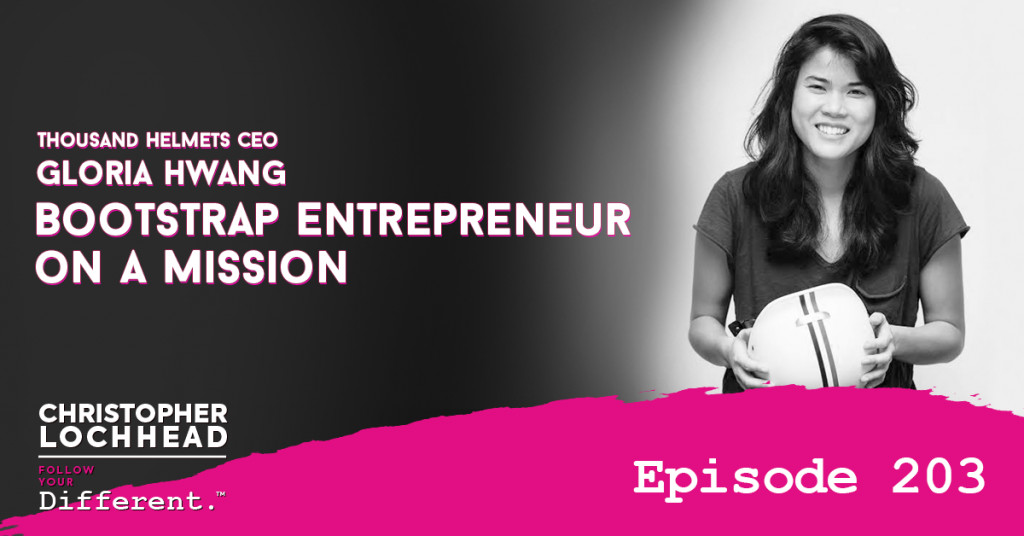
Podcast: Play in new window | Download (Duration: 1:21:08 — 55.7MB) | Embed
Subscribe: Apple Podcasts | Spotify | Pandora | RSS | More
Gloria Hwang was a long-time cyclist who never wore a helmet. She thought they were too bulky, inconvenient, and space-agey looking. Then, a friend of hers died in a bike accident. She decided something had to be done about helmets. Gloria, a savvy professional who’s been working for five years inside the legendary Tom’s shoes, saw the new mobility category designed right in front of her eyes.
With a very small amount of money and a Kickstarter campaign, she started Thousand Helmets. In this episode, we talk about Gloria’s story, as an entrepreneur and category designer and her mission of saving lives.
The Mission of Thousand Helmets
When Gloria decided to buy a helmet for herself, she saw a bunch of passable-looking helmets, but there’s nothing she wanted to wear. The number one reason people don’t ride a bike, skateboard, or scooter is they just don’t feel safe. So, she believed that making a helmet that people would want to wear could help save a lot of lives:
“I really believe that I can create a product that people want to wear and I could solve a lot of problems. They could help save lives, and I could get people moving around cities in a different way.” – Gloria Hwang
Prioritizing the Customer’s Perspective
As helmets have been around since forever, Christopher asks Gloria how she saw an opportunity to create a different category of helmets. She says that it was all about customer insight as she was once a customer. Their first products were based on a human-centered design perspective and not on a market perspective.
“As a consumer, you have a whole different set of customer needs and problems than what’s on the shelves. Then you kind of know that there is something out there for you that needs to be created.” – Gloria Hwang
Design Philosophy
Gloria shares the fundamental concepts in their product development process. The first one is style, and the second one is safety so that people can be safe and look stylish at the same time. The last one is convenience, which created the idea of their secret PopLock function to avoid theft when people leave their helmets behind.
“There’s the execution where things need to be beautiful and high quality, but it always goes back down to what the customer would be thinking right now and what problem they encounter when they’re deciding to pick up a helmet. So, at the end of the day, it’s kind of trying to get a good understanding of what that customer wants.” – Gloria Hwang
To know more about Gloria Hwang and how to be a bootstrap entrepreneur, download and listen to this episode.
Links:
Designer Spotlight: Thousand Bike Helmets Become A Stylish Safety Accessory
We hope you enjoyed this episode of Follow Your Different™! Christopher loves hearing from his listeners. Feel free to email him, connect on Facebook, Twitter, Instagram, and subscribe on iTunes
096 Silicon Valley’s Secret Marketing Assassin Rick Bennett
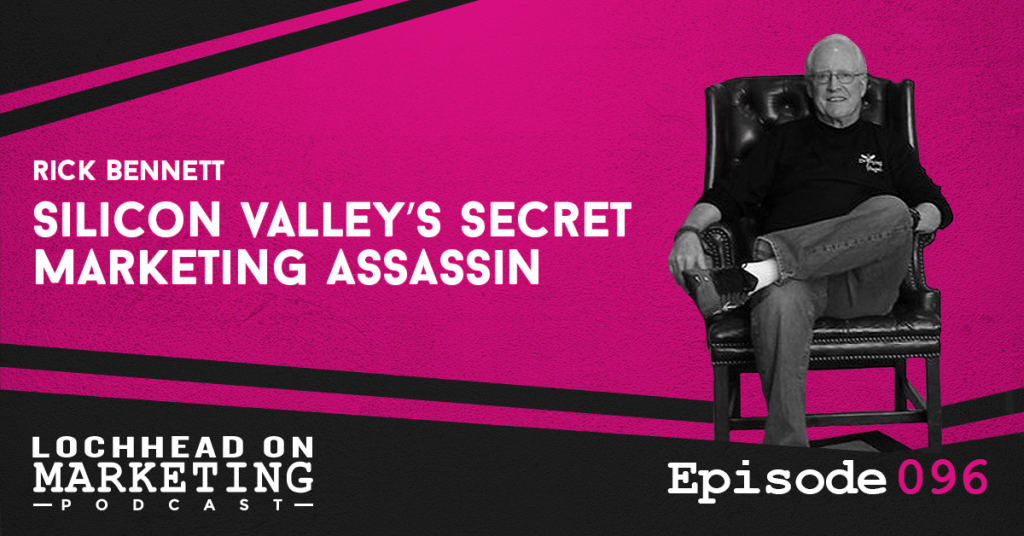
Podcast (lochheadonmarketing): Play in new window | Download (Duration: 1:06:59 — 46.0MB) | Embed
Subscribe: Apple Podcasts | Spotify | RSS | More
Advertising is a powerful thing in the world of business. Whether you have a start-up or a successful company, you still need an effective advertisement to propel your brand forward. Silicon Valley’s secret advertising weapon, Rick Bennett, is here with us today to give pieces of advice about advertising and marketing. Also, he talks about how being wise and having good decisions help us as human beings.
Technological Intimidation
Rick says that the best thing to do when advertising is to avoid saying anything that a competitor could say. You’ve got to rebut if a competitor tries to provoke you by saying he’s wrong and it’s not true. Also, he says that the trick is not to get sued for libel or slander.
“You have to use technological intimidation. You can only speak to the technological truth. We don’t call someone a liar. We can say, well, this isn’t true, and we prove why.” – Rick Bennett
Rhetorical War Gaming
Rick is a master at writing legendary headlines back in the day. Christopher asks him when is the right time to invest in an advertisement after creating a headline and then testing it. He says that rhetorical wargaming using SurveyMonkey to test a bunch of ideas is helpful and also giving a free product to the audience:
“Survey monkey is good, but the trick is the giveaway. You need to offer a free product that anybody can log on to and check out your AI. That could be very granular and atomic and just take off.” – Rick Bennett
How to Function Creatively
Christopher and Rick talk about the assault on the Capitol that happened on January 6, where several people died because of the riot. Christopher says that politics was about arguing to solve problems, and now it’s just about arguing to continue to argue. Rick agrees, and he says that we can’t change anybody’s mind, so we have to change the playing field.
“One idea that I have is that creativity and genius cannot exist in a state of anger. In other words, you get angry on either side, and you have destroyed your ability to function creatively. Creativity is a curse. That’s the way I kind of cloister myself in the pirate cottage here up in the mountainside, and I try not to let anything destroy my creativity as it is.” – Rick Bennett
To know more about Silicon Valley’s Secret Marketing Assassin Rick Bennett, download and listen to this episode.
Bio:
Rick Bennett specializes in guerrilla warfare marketing.
He’s been the secret advertising weapon to Silicon Valley entrepreneurs for over 30 years.
Two of his most spectacular successes are Oracle and Salesforce.com.
Links:
We hope you enjoyed this episode of Lochhead on Marketing™! Christopher loves hearing from his listeners. Feel free to email him, connect on Facebook, Twitter, Instagram, and subscribe on Apple Podcast! You may also subscribe to his newsletter, The Difference, for some amazing content.
095 How To Secure Your Financial Future

Podcast (lochheadonmarketing): Play in new window | Download (Duration: 18:53 — 13.0MB) | Embed
Subscribe: Apple Podcasts | Spotify | RSS | More
In 2019, CNBC reported that 27% of Americans “would have to borrow or sell something to pay for a $400 emergency. Further, Nation.com reports in 2018, 4% of American adults reported not having enough food and by July of 2020, that figure had exploded to 11% and they say it will probably continue to increase as the pandemic worsens.
Most recently, Pew Research finds that one in four American adults have had trouble paying their bills since the coronavirus outbreak started. So the reality is, this pandemic has exposed how financially vulnerable many of us are.
So in this episode, let’s talk about your career and how you can become financially free.
You Can Turn Your Situation Around
Christopher has his fair share of financial struggles growing up. He was raised in a single-parent household and experienced business failure in his early 20s. It was the most challenging financial situation of his life, as he describes.
“The goal here is a very simple one to understand when your investment income pays your living expenses, you’re financially free. That’s a very powerful day in a person’s life. So I want to share with you a few things I’ve learned along the way. It’s also important to know I am in no way, shape or form a financial advisor accountant or anything of the, like. I’m just a guy that’s learned a few things along the way, and I’ve been taught a few things by some legendary folks.” – Christopher Lochhead
Build A Financial Egg Nest
Ultimately, the objective is to build a financial nest egg. The concept is over time, you convert getting paid for your time to getting paid from your investments. In simpler terms, you have to find a way to earn income while you are asleep. As Tim Rhode, founder of One Life Fully Lived, calls it, its horizontal income.
“In order to create a nest egg that starts producing horizontal income, you can, A. Lower your expenses or B. Increase your after-tax income. If you do both, then you’ll have even more money to build your nest egg.” – Christopher Lochhead
Don’t Buy Shit You Can’t Afford
Christopher shares his observation among the younger generation nowadays and gives a reminder, to not buy shit you can’t afford. He also mentions listening to financial planning experts, as they say, credit card debt is a sure-fire way to keep yourself enslaved.
“Get out of credit card debt as quickly as you can. Don’t buy shit you can’t afford and, uh, and save up.” – Christopher Lochhead
To know more how to secure your financial future, download and listen to this episode.
Bio:
Christopher Lochhead is a #1 Apple podcaster and #1 Amazon bestselling co-author of books: Niche Down and Play Bigger.
He has been an advisor to over 50 venture-backed startups; a former three-time Silicon Valley public company CMO and an entrepreneur.
Furthermore, he has been called “one of the best minds in marketing” by The Marketing Journal, a “Human Exclamation Point” by Fast Company, a “quasar” by NBA legend Bill Walton and “off-putting to some” by The Economist.
In addition, he served as a chief marketing officer of software juggernaut Mercury Interactive. Hewlett-Packard acquired the company in 2006, for $4.5 billion.
He also co-founded the marketing consulting firm LOCHHEAD; was the founding CMO of Internet consulting firm Scient, and served as head of marketing at the CRM software firm Vantive.
Links:
Covid-19 and the Nightmare of Food Insecurity
Economic Fallout From COVID-19 Continues To Hit Lower-Income Americans the Hardest
Tribe of Millionaires: What If One Choice Could Change Everything?
Rich Dad Poor Dad: What the Rich Teach Their Kids About Money That the Poor and Middle Class Do Not!
We hope you enjoyed this episode of Lochhead on Marketing™! Christopher loves hearing from his listeners. Feel free to email him, connect on Facebook, Twitter, Instagram, and subscribe on Apple Podcast! You may also subscribe to his newsletter, The Difference, for some amazing content.
202 Harvard’s Top Astronomer Says Aliens Tried to Contact Us | Dr. Avi Loeb, Author, Extraterrestrial: The First Sign of Intelligent Life Beyond Earth
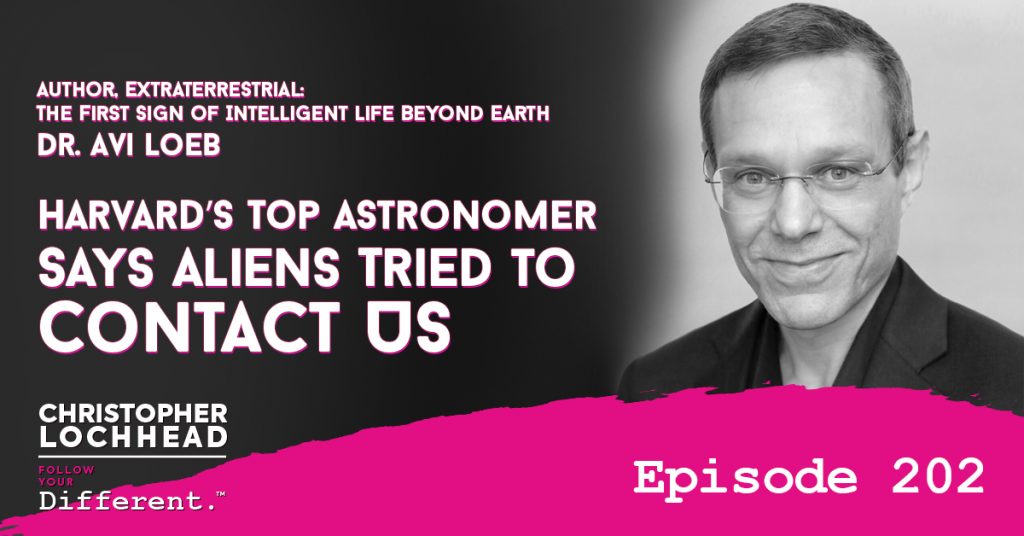
Podcast: Play in new window | Download (Duration: 1:26:58 — 59.7MB) | Embed
Subscribe: Apple Podcasts | Spotify | Pandora | RSS | More
Harvard’s top astronomer professor Avi Loeb, just published a book called Extra-Terrestrial, The First Sign Of Intelligent Life Beyond Earth. He believes that in 2017, the highly unusual object that passed by earth called Oumuamua, was likely alien.
So in this episode, we go deep into obvious hypotheses, the attributes and characteristics that prove that Oumuamua was not a comet or an asteroid or anything else we’ve seen before. We also dig into why the good professor thinks it was likely alien. We discuss why he thinks science is a “dialogue with nature” and why at massive personal risk, he decided to come forward with his theory.
Science as a Dialogue with Nature
Avi says that science is a way of appreciating and understanding the world. It is not in conflict with religion either. Science explains how things work and it increases your own understanding of nature. Additionally, he says that he’s frustrated because many scientists focus on concepts without evidence and have no connection to experiments:
“There is no evidence that these ideas are valued and that they actually describe nature. To me, that’s a betrayal of traditional physics, where we were supposed to have a dialogue with nature, not a monologue. We’re not supposed to tell nature what it is but listen for experiments to what nature is.” – Avi Loeb
The Discovery of Oumuamua
Christopher and Avi talk all about the likely alien, Oumuamua. Avi says that before discovering Oumuamua, they haven’t seen an object in outer space that moves too fast and more powerful from the gravitational pull. This ability to escape the gravitational pull of the sun was a huge discovery and led to the idea that an alien passed by the Earth for a visit.
“It’s just that it’s relative speed. If a bullet moves too fast relative to the earth or, if a spacecraft moves too fast, it will never fall. It would just escape. So the issue is how fast does an object move relative to the source of gravity? All the objects we have seen before were bound to the sun that was relics from the formation process of the solar system.” – Avi Loeb
Claims About Oumuamua
After discovering Oumuamua, astronomers claimed that it was just a comet or an asteroid that came near the Earth. Another object with an extra push similar to Oumuamua’s was also discovered. However, it turns out it was a rocket booster that left the Arabs in 1966. This event somehow proved that Oumuamua is indeed peculiar.
“The actual discovery of Oumuamua is by itself a puzzle. It means that the abundance of such objects is much greater than would be expected from the rocks that occupied the solar system at any event. Putting that aside, this object was peculiar. It exhibited an extra push of the type that you expect from a comet.” – Avi Loeb
To know more about Harvard’s Top Astronomer and the Aliens Who Tried to Contact Us, download and listen to this episode.
Bio:
Abraham (Avi) Loeb is the Frank B. Baird, Jr., Professor of Science at Harvard University.
He received a Ph.D. in Physics from the Hebrew University of Jerusalem in Israel at age 24 (1980-1986), led the first international project supported by the Strategic Defense Initiative (1983-1988), and was subsequently a long-term member of the Institute for Advanced Study at Princeton (1988-1993).
Loeb has written 8 books. These includes most recently, Extraterrestrial (Houghton Mifflin Harcourt, 2021), and about 800 papers (with an h-index of 113) on a wide range of topics. Topics include black holes, the first stars, the search for extraterrestrial life and the future of the Universe.
He had been the longest-serving Chair of Harvard’s Department of Astronomy (2011-2020), Founding Director of Harvard’s Black Hole Initiative (2016-present), and Director of the Institute for Theory and Computation (2007-present) within the Harvard-Smithsonian Center for Astrophysics.
He is the Chair of the Board on Physics and Astronomy of the National Academies (2018-present). Additionally, he is also an elected fellow of the American Academy of Arts & Sciences, the American Physical Society, and the International Academy of Astronautics.
Loeb is a member of the President’s Council of Advisors on Science and Technology (PCAST) at the White House and a member of the Advisory Board for “Einstein: Visualize the Impossible” of the Hebrew University.
He also chairs the Advisory Committee for the Breakthrough Starshot Initiative (2016-present). Further, he serves as the Science Theory Director for all Initiatives of the Breakthrough Prize Foundation.
In 2012, TIME magazine selected Loeb as one of the 25 most influential people in space. In 2020 Loeb was selected among the 14 most inspiring Israelis of the last decade.
Click here for Loeb’s commentaries on innovation and diversity.
Links:
Amazon Books – Extraterrestrial: The First Sign of Intelligent Life Beyond Earth
Harvard’s Top Astronomer Believes Aliens Tried to Contact Us in 2017
A Harvard professor says an alien visited in 2017 — and more are coming
We hope you enjoyed this episode of Follow Your Different™! Christopher loves hearing from his listeners. Feel free to email him, connect on Facebook, Twitter, Instagram, and subscribe on iTunes

